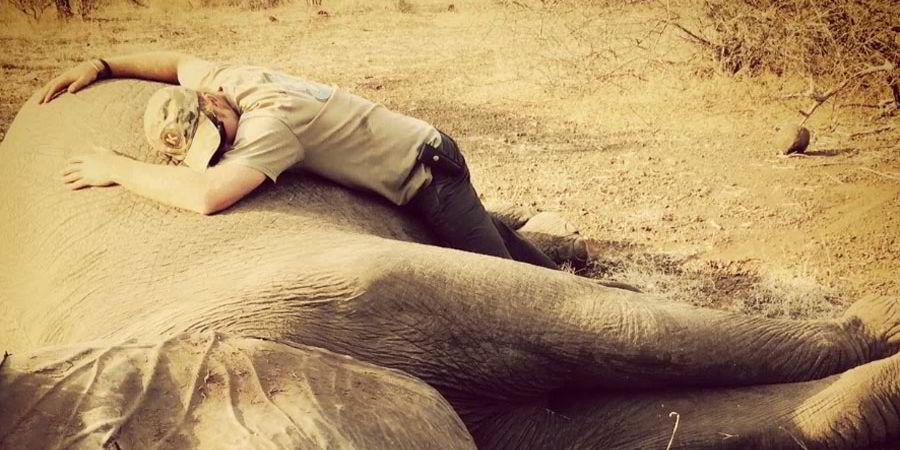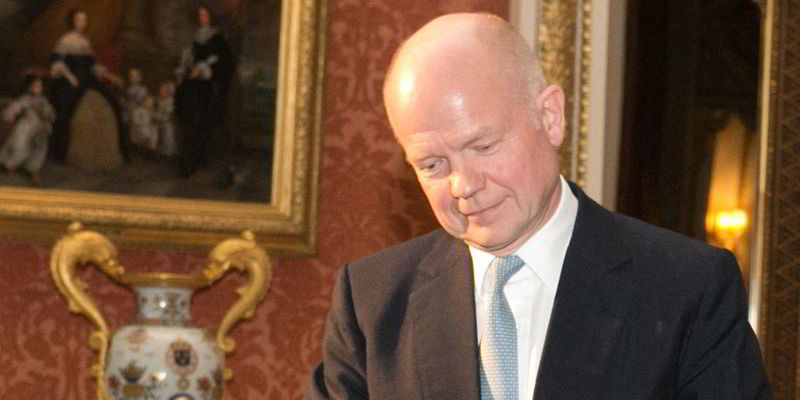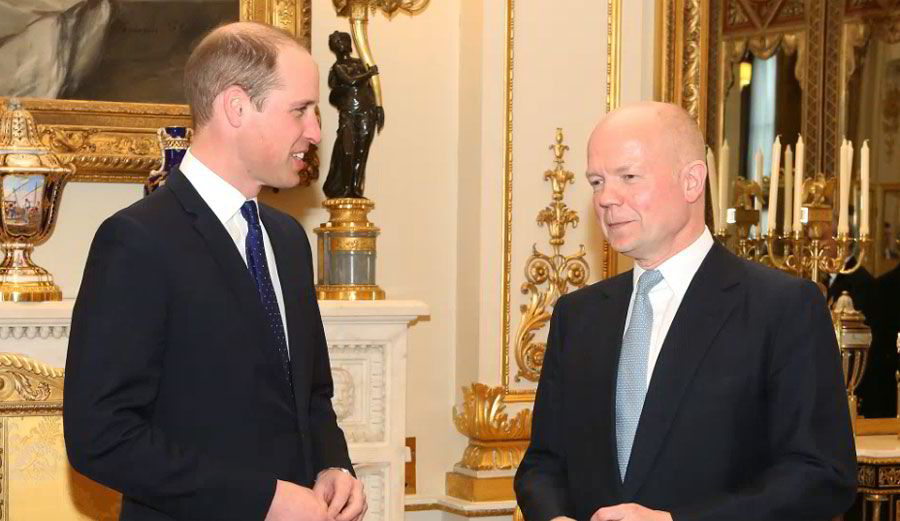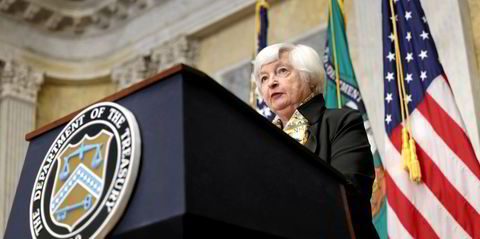William Hague is not everyone’s idea of an environmentalist. A teenage political star of the Margaret Thatcher era, he has been in the public eye as a British parliamentarian for nearly 30 years.
Nor does the Yorkshireman fit a cliched vision of a cheerleader for the positive potential of shipping and ports companies.
These days, with his formal title of Lord Hague of Richmond and office in Westminster, London, he appears very much part of the modern metropolitan political elite so vilified by the new breed of populist politicians in Europe and America.
But the former UK foreign secretary and Conservative Party leader has emerged as the unlikely figurehead of United for Wildlife, a campaign to encourage shipowners, lines, ports and airlines to help slow the trade in illegal animal parts that is threatening the African elephant and the white and black rhinoceros with extinction.
Now, as the campaign takes shape, Hague is calling on more shipping people and companies to play their part in stopping the trade in items that are turned into ornaments and traditional medicines in Asia.
“I think it is totally unacceptable that we watch while over a short period — just one generation — those animals we all revere are devastated,” he tells TW+. “If all the airlines, shipping lines and freight forwarders implement this [plan], in itself it would be a very powerful statement.
“It’s an important matter of human development as well as a matter of saving wildlife. So for all those reasons there is a responsibility on everyone, in government and the private sector, to get involved.”
Hague’s leadership of United for Wildlife emerged as a by-product of his time in office and friendship with the Duke of Cambridge, Prince William.
William and his younger brother, Prince Harry, set up the Royal Foundation in 2009 as the main vehicle for their philanthropic activities. Alongside the Invictus Games for wounded service personnel, the Heads Together mental health network and projects to help young people, the foundation backs several environmental campaigns.
United for Wildlife is a collaboration between the foundation and seven international conservation organisations to scale up the response to environmental crises.

Prince William asked Hague to lead the campaign’s transport taskforce after he chaired the world’s first intergovernmental conference on animal trafficking in London in February 2014 while he was still foreign secretary.
“He’s very passionate about the issue,” Hague says. “I got very interested in this subject and asked more than 40 governments to come together from all over the world to work out how we would tackle this problem, in particular in Africa.”
He hopes that attention on the threat to elephants and rhinos will help undermine the trade in less photogenic species that are also at risk, such as the pangolin, which is the most trafficked animal in the world. “It is an extremely sad story.”
United for Wildlife is campaigning for better conservation of endangered animals in Africa as well as reducing demand for animal parts by educating consumers, especially in China, Vietnam and Thailand, which are the biggest markets.
Hague and the prince believe there has not been adequate attention focused on the transport of animal parts. “The question is: how do you actually intercept these shipments? Because success in that area could make it much harder to supply those markets and reduce the reason to kill those animals,” he says.
The scale of the global trade in wildlife is huge. At the start of this decade up to 30,000 elephants were being illegally killed each year, causing their numbers to plunge in Tanzania alone from more than 100,000 to around 43,000 in 2014, according to TRAFFIC, the joint project between WWF and the International Union for Conservation of Nature.
The latest figures show an even more worrying collapse to 352,271 savannah elephants in nearly all of sub-Saharan Africa, according to Elephants Without Borders, a research organisation that has just completed an 18-country census which shows a 30% decline in population between 2007 and 2014.
Between 2005 and 2009, more than 12,000 seizures of illegal wildlife products were made in the EU, with estimates of the global trade running into hundreds of millions of dollars.
TRAFFIC is involved with the US Agency for International Development in another scheme aimed at cutting the transport of endangered species, called Routes (Reducing Opportunities for Unlawful Transport of Endangered Species).
United for Wildlife’s transport taskforce started work early last year, bringing together international agencies and leading commercial sector players to set a framework to create tools to help restrict the trade.

Among the early joiners were Dubai Ports, Emirates Airline and Kenya Airways, which were supported by WWF, the World Customs Organization (WCO) and the secretary-general of CITES, the international agreement on illegal wildlife trade.
“And I’m glad to say Maersk were early joiners, after a few months, as they are the biggest container line in the world,” says Hague. From that start, the taskforce has grown to more than 60 companies, although airlines remain the largest sector represented.
“It is a unique grouping. In some ways it is surprising it has never been done before, but it is good we are doing it now. It shows how this country and our royal family have a particular convening power of bringing together combinations of people.”
Now backed by the secretary-general of the International Maritime Organization (IMO), Kitack Lim, who hosted a meeting in June, more shipping lines have joined, including China Cosco Shipping, Hamburg Sud and the owners’ lobby, the International Chamber of Shipping.
“What our taskforce has shown is that there is a real willingness in the private sector as long as people know how they can help. It is really refreshing to see that willingness. Companies get really engaged and passionate!” Hague says.
Key to the taskforce’s intention to reach out to all companies is the declaration signed at Buckingham Palace in March by all members. Its 11 commitments focus on practical measures that are intended to encourage and enhance companies’ ability to act.
Hague sums them up as concentrated on four areas: zero tolerance towards the illegal wildlife trade; receiving and listening to the latest intelligence on trade routes and methods; warning authorities when activity is suspected; and creating best practice at airports and ports.
Zero tolerance of illegal activity is a vital starting point, he argues, urging companies to promote it to staff and customers as a key corporate value.
“We are not just saying, ‘Say you don’t tolerate it’. There are things you can do about not tolerating it, such as telling and educating your staff and your customers. If that was sufficiently widespread, it would make it a lot harder for the criminals.”
The second strand is a new intelligence analysis system using IBM’s i2 Analyst’s Notebook software, which will give users a clear picture of the latest smuggling routes and methods.
Maersk and the World Conservation Society have been instrumental in bringing the project together. It is now on the point of launch, when funding is in place.
“The system makes the latest information usable in a way that is sufficiently focused for companies to be able to be on alert and do something about it. It is unlikely to identify an individual package, but it is likely to guide to where you should focus,” says Hague.
On the other side of the coin, the declaration’s signatories are encouraged to train their staff to detect and report suspected illegal wildlife trade wherever they see it.
A reporting service is under development as part of the WCO’s Environet platform, which will enable transport companies to pass intelligence to national customs authorities while preserving confidentiality.
“Companies may wish to go straight to their national authorities, but this allows them a second route for doing that. It gives companies a reliable means of doing something about it, which is going to be pursued and is agreed internationally by the WCO and backed by the IMO,” Hague says. “Again, it shows there are practical things you can do if you sign the Buckingham Palace declaration.”
Improving operations at ports, especially in East Africa, which are main transit points for these goods, is vital. DP World and Dubai customs have been a “tremendous assistance”, says Hague.
“The UAE has been a very helpful country overall and work is now getting under way with Tanzania and Kenya to enhance the ability to detect these cargoes using the most up-to-date techniques.”
East African governments and companies have been helpful, with ministerial support maintained in Tanzania, for instance, despite a change in government.
Stamping out the trade is not easy, as most of the illegal products are transported in containers by independent freight forwarders, and shipping lines hold little accurate information about the content of those boxes.
“That’s why, to tackle it, you have to have a risk-based approach. You have to have systems that are designed to help narrow down and focus the search.”
Bookending the drive to halt the transport of illegal wildlife are attempts to stop the poaching of animals and campaigns to reduce demand through education.
“Reducing demand is the crucial thing,” admits Hague. “That’s how you beat it in the end. We will win this comprehensively when we defeat demand. Everything else is containing or mitigating the problem.”
Engagement is vital, since Asia is one of the world’s biggest markets, while its rapid industrialisation has created hundreds of millions of potential new consumers of traditional remedies that use parts of rare animals.
“China has now signalled at the very top level that change is happening,” observes Hague. “It is still necessary to persuade the person buying these products not to do so.”
President Xi Jinping committed to a near-total closure of China’s domestic ivory market when he met US president Barack Obama last autumn. During a trip to China in March this year, Prince William raised the issue with Xi, and made a television address that was watched by an estimated 300 million Chinese.
Hague draws optimism from the virtual eradication of Japan’s ivory trade in the 1980s after a campaign that made it socially unacceptable.
“Attitudes are starting to change. Governments in Southeast Asia are taking this more and more seriously. If we can obstruct this trade and make it as difficult as possible over the next few years, then we really can save these iconic species,” says Hague.
“We are saying there is a way to get involved: if you want to help, you can. You sign the declaration, join these great companies and implement whatever’s appropriate in your own business.”
PLUS POINT 1
William Hague spoke to TW+ about United for Wildlife on the historic June day when British voters were deciding whether the country should stay in the EU.
On that morning Westminster — the political heart of the UK — was unusually quiet and opinion polls suggested a narrow victory for those wanting to remain, but the result went the other way, creating a seismic political shock.
Hague played a relatively low-key role in the campaign, having stepped down as a Member of Parliament at the 2015 general election before being appointed to a seat in the upper chamber, the House of Lords, by his political ally, the then prime minister, David Cameron.
Although a Eurosceptic, Hague was reluctantly in favour of EU membership. “We are in an imperfect world and many of the choices we make in life or in politics are between the lesser of evils,” he told the BBC.
“I remain a critic of the EU... but you still have to make a cool-headed decision when it comes to leaving. It is in the interests of the people of this country, in the interests of their jobs and businesses in particular [to remain in the EU].”
Less well known than Hague’s views on Europe was his role in backing Cameron’s ill-fated decision to hold the referendum in the first place.
In the run-up to the 2015 election and faced with a hostile right wing, Cameron was desperate to hold his party together. Hague supported the idea of making a binding commitment to hold a referendum, perhaps partly in the hope that circumstances would change.
In a scene straight from the pages of political fiction, the fateful decision was apparently taken at an informal meeting in a pizza restaurant at Chicago’s O’Hare airport between Hague, Cameron and his chief of staff, Ed Llewellyn, according to the Financial Times.
The rest, as they say, is history.
The vote was lost, Cameron resigned, and his arch-rival Boris Johnson lost the fight to be the new prime minister to Theresa May, who then promptly sacked chancellor George Osborne.
Hague now has no formal role in government, although he retains his seat in the Lords.
Among his outside interests, he is chairman of ICE Futures Europe, the London derivatives exchange, chair of the international advisory group of law firm Linklaters, a senior adviser at Teneo Holdings and chairman of the Royal United Services Institute.
PLUS POINT 2
WWF lists 16 mammals as critically endangered — six of them on the Indonesian islands of Java, Sumatra and Borneo. The animals on the list are the Amur leopard, black rhinoceros, Bornean orangutan, Cross River gorilla, Javan rhinoceros, mountain gorilla, orangutan, pangolin, saola, South China tiger, Sumatran elephant, Sumatran orangutan, Sumatran rhinoceros, Sumatran tiger, vaquita and Western Lowland gorilla.






